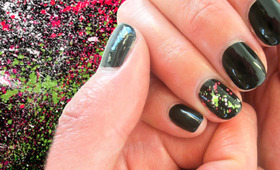Fridge or Vanity? Does it Matter Where You Store Your Beauty Products?
Published Aug 7, 2013

The word “perfume” is the coldest word I know. That’s because when I was growing up, my mom kept all her perfume in the fridge, behind the milk. It “kept better that way,” she said, and when there was a special family occasion, she’d reach in past the butter and cheese, grab her bottle of 4711 or Shalimar, and spray one icy squirt of perfume behind my ears.
Freezing cold sophistication.
As a preteen, I took to placing my bottles of Exclamation! and Love’s Baby Soft next to her perfume bottles. I put my moisturizer in there as well, along with my Sea Breeze toner and all my nail polish, because I’d read in Seventeen that nail polish should be kept in a cool, dark place. The fridge door began to rattle with tiny glass bottles every time you opened it.
In college, I learned that almost no one put their beauty products in the fridge. And there was no more room in my dorm’s mini-fridge, anyway. Now, as an adult, I refrigerate my face toner, along with a green eye mask and my favorite Essie shade (Russian Roulette). That’s about it. But I’ve noticed some of my perfumes losing color over time, and I can’t help but wonder: would they be doing better in the fridge? Was my mother right?
To find out the truth I asked Jenny Frankel, beauty engineer and consultant at Frankly Beauty and a former cosmetics formulator, to shed some light on whether we should be refrigerating our beauty products. What I found is that products generally fall into three categories—stuff you should store in the fridge, stuff you don’t need to, and stuff you should not refrigerate.** **
Fridge = Yes!
According to Frankel, if you’re dealing with products made without preservatives, a cool, dry storage environment like a fridge is the way to go, as it protects them. Other products that benefit from fridge storage are waterproof or long-lasting mascaras or eyeliners, because they contain “volatile actives.” “Heat accelerates volatility and the drying out of a product,” Frankel explains, “so fridge storage could help a waterproof product last longer.”
If you live in a warmer climate, you might consider refrigerating moisturizers to increase their shelf life. Usually, temperatures above 104 degrees Fahrenheit/40 degrees Celsius will cause a product to age (that is: separate, curdle, melt, soften, yellow, or smell) three times faster than if the product was stored at room temperature or below. Frankel also says if a product contains heat-unstable vitamins like C and A and is in packaging that’s not airtight, the active ingredients will become inactive faster at elevated temperatures. This includes any product you’ve opened that doesn’t come in a sealed tube, airless pump, or brown UV-protected bottle (see next section for more on this).
I mentioned that my mom kept her 4711 “toilet water” in the fridge during summer, splashing it on to keep cool. Frankel says this makes sense. “You might refrigerate a product for therapeutic benefit, like aloe gel or eye cream, for a cooling effect. Products with water-based ingredients work fairly well in the fridge,” she says.** **
Fridge = Optional
Generally speaking, if your room temperature is between 59–70 degrees F/15–21 degrees C, refrigeration is not required—unless the product directions specify. “As a general rule, all stability product testing is performed at a room temperature to ensure product shelf life at store temperature. Think about the temperature at department stores, pharmacies, and specialty stores,” Frankel explains.
Generally speaking, if your product has UV-protected packaging (usually, these are dark brown) or comes in a sealed tube or airless pump, you don’t need to refrigerate it. And if a product contains preservatives, you can store it at room temperature.
Fridge = No-No
So is it ever not a good idea to store in the fridge? Yes, says Frankel, since oil or wax-based formulas can solidify at low temperatures, just like olive oil. “Products like Moroccan oil, face oils, silicone primers, and liquid foundation may solidify in the fridge—or the consistency just may end up being funny. Store those at room temperature,” she recommends.
So: my mom was right! But also, everyone is right! Refrigeration can be beneficial with certain beauty products, like perfumes in clear bottles and waterproof mascara, but it can be totally unnecessary with others, such as foundation in airtight packaging or face moisturizer stored at room temperature. Science wins! Frankel has one last nugget of advice, “The general rule is, packaging and storage does affect product shelf life. Light, humidity and moisture, air, and heat will age a product faster.”
Image Credit: Image Source













